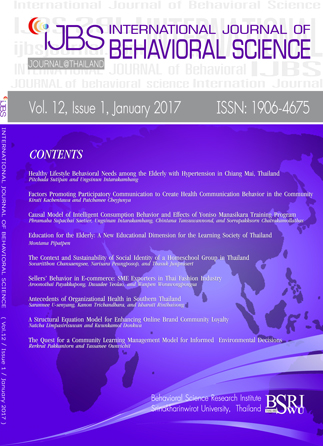Sellers’ Behavior in E-commerce: SME Exporters in Thai Fashion Industry
Main Article Content
Abstract
This study was aimed to examine the factors affecting e-commerce by investigating behaviors among Thai SMEs exporters in fashion industry. Data was collected by questionnaires measuring nine independent variables and the two dependent variables of the intention of adopting e-commerce and e-commerce adoption behavior. Structural Equation Model was applied for analysis. The results shown that the hypothesized model was a good fit ((c2 (14, N=345) = 18.84, p = 0.17), GFI = 0.99, RMSEA = 0.032, CFI = 1.00, NNFI = 0.99.) Perceived behavior is the only factor that had a direct effect on e-commerce using behavior. Intention to use e-commerce, perceived behavioral control competitive pressure, customer pressure, attitude toward e-commerce using and perceived benefits regarding to e-commerce using, all had direct effects on the intention to use e-commerce. The results from this study could be beneficial to develop positive attitude toward e-commerce using behavior, perceived benefit and perceived behavioral control among Thai SMEs exporters. Experimental research is suggested for testing reliability and validity of this research model. In addition, further research efforts in understanding the constructs of attitude toward behavior, perceived benefit and perceive behavioral control could be useful for developing SMS exporters’ positive attitude toward e-commerce using behavior, perceived benefits and perceived behavior.
Key words: e-commerce, theory of Planned Behavior, innovation decision process


